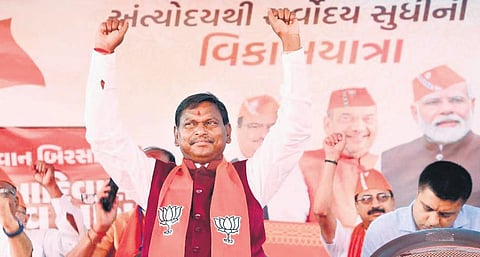

After the elevation of Droupadi Murmu as the 15th President of the country, the Modi government has sought to turn the focus of Indian politics to the estimated over 10.43 crore Scheduled Tribe population of the country. In an interview with Rajesh Kumar Thakur, Union Tribal Affairs Minister Arjun Munda while describing the community as “victims of economic backwardness” says the Modi government continues to work for various denominations of tribal communities within the constitutional parameters.
Excerpts:
To what extent has the status of the ST community changed in the country since the Modi government came to power in 2014?
The ST communities feel encouraged by various steps the government has taken for their participation in good governance. A slew of schemes have been launched for their empowerment and many more such plans such as the one on the lines of Aayushman Bharat are in the pipeline. The Ministry of Tribal Affairs is working through a focused approach to connect the ST people with mainstream development. The changes are visible.
What has been the root cause of the ‘economic backwardness’ of STs?
No doubt, tribal communities lag behind in modernity, but it won’t be proper to call them ‘backwards.’ They have their own lifestyle, culture, social and traditional values, besides an indigenous identity. We can call them ‘victims of economic backwardness’ in a limited context because of the ever-changing economic policies. My ministry is committed to their empowerment and all-around development. Most tribal communities in the country are blessed with natural resources such as an abundance of minerals. What is lacking is awareness about sincere efforts being made for their development. The present government is working with the idea of sab ka sath, sab ka vikas.
The linguistic minority of Paharis in J&K will soon get the ST status. Don’t you think it will amount to opening Pandora’s Box?
The Paharis are not a linguistic community. It is a ‘characteristic’ community. The government has accorded it the ST status only after it met all characteristic parameters following detailed research work and after completing the constitutionally set formalities. It’s not a political, but purely a Constitutional and merit-based decision.
The Gujjar community in J&K has also been brought under ST. What is the ground provided for this by Justice GD Sharma Commission?
Everything in this regard has been done in line with constitutional parameters. The Gujjar community in J&K is also counted as a characteristic community, so please don’t read anything beyond it.
What are the other plans for expanding the ST list?
We are not supposed to make any political comment on it. Such work continues based on research. At the moment, I can say the work involves many formalities, laid down parameters and research. Then, as I said, the ministry has to follow constitutional provisions. Therefore, the government’s move should not be viewed politically. Nor should it be seen from the point of view of a community-specific programme. One should look at it from the ‘characteristic’ point of view.
Has the confidence level in tribal communities gone up?
It has surely gone up. The decision to celebrate Birsa Munda’s birth anniversary every November 15 as ‘Janjatiya Gaurav Divas’ is one such measure to make tribal communities realize their significance. In the new education policy too, linguistic, cultural and other traditional identities have been promoted. The SC/ST (prevention of atrocities) Act has also been sharpened. For the first time in the country, a woman coming from a tribal society has become the President of India.
How has ‘Going Online Leader’ (GOAL), a digital literacy and mentorship initiative, helped the tribal youth?
The GOAL project has given encouraging results. Facebook, as part of its philanthropic work, is piloting the project for tribal youths. Our ministry is providing moral support to this social networking-driven initiative. It ensures that the tribal youth are connected through the network-based initiative in their educational empowerment.